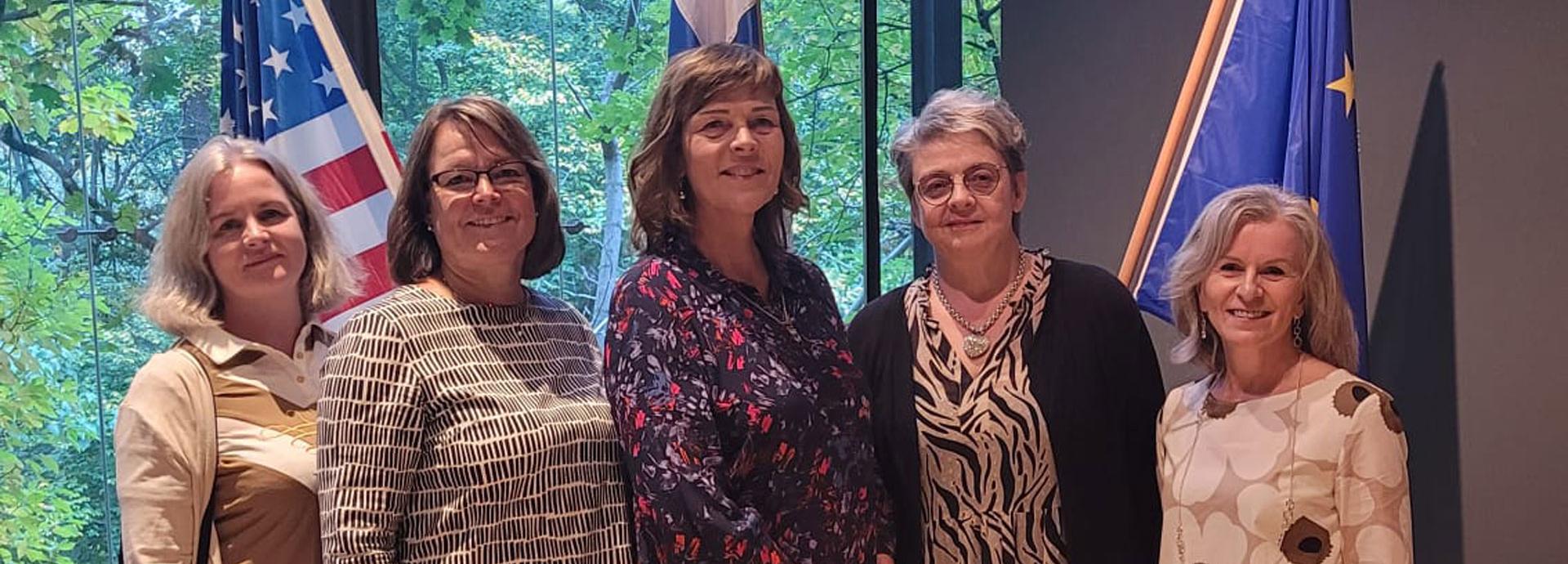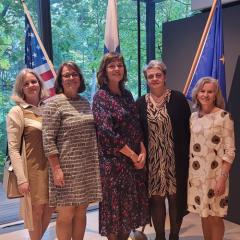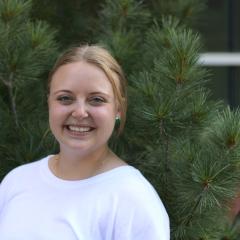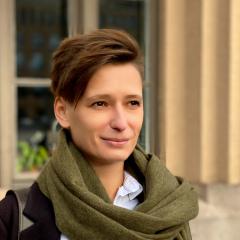

Day 1
On our first day we got the opportunity to visit Columbia Heights Education Campus, which included both high school and middle school. Principal Maria Tukeva had founded the school to help students at risk of exclusion to finish high school. She started with 40 teenagers and now CHEC has 1600 students. School has students from all over the world.
English teacher and 2017-18 Fulbright Inter-Country Travel grantee to Finland Joe Talarico directed us to his classroom. Students had made poems about racism, discrimination or about their nationality. We got to hear very private poems and were very grateful that they shared these beautiful thoughts with us. We also got to see bilingual teaching and co- teaching. There was also an earthquake drill during that day, which was new to all of us.
Day 2
The second day of our trip started by attending the ASCD Leadership Summit at the Gaylord Convention Centre in the National Harbour, Arlington.
Mary Anne Butler, superintendent and Fulbright alumna, together with Alicia Dawe, principal from Stonington High School, introduced their tools for creating trauma-sensitive classrooms. These tools are more important now than ever as staff and students continue to recover from the trauma of the pandemic.

According to Butler and Dawe superiors could visit the classrooms and give positive feedback to the staff by leaving a positive note to them. The same applies the students. Positive feedback is needed. The students should also have a sense of belonging to a community. This can be done by giving a VOICE for the students to choose the themes for the whole school community development, e.g. Self Discipline, Kindness or Empathy.
In the afternoon we visited Alice West Fleet Elementary school in Arlington. It is an impressive, new school to visit. It is self-sufficient in producing energy and its’ multicultural student and staff body make sure that all students' needs are met regardless of their language and culture. The school has a lot of immigrants and among them are also students who have hearing difficulties. Jennifer Gildea, principal of the school, showed the school building and introduced their methods on how they support students with different needs. The key to sufficient support is a sufficient number of skilled and multilingual staff.
Day 3
Our second day at the ASCD leadership summit was very powerful. We had a chance to listen to Deputy Superintendent in Dublin, Ohio Jen Swanke about how school leaders can support and motivate their teachers.
According to her, hope is no strategy; we need to have courage to do what needs to be done in spite of fear. Hard conversations are the best investments for the future. When you are brave enough to have these conversations with your staff, you will gain more respect and trust among your staff.
Leaders should also really hear what teachers are truly saying. Jen Swanke also reminded us that we should always remember that the loudest voice isn`t always the leading voice.
We left the summit that day truly inspired and bought Swanke's book!
Day 4
This day was our last day of the ASCD leadership summit. Erica Battle gave an insightful presentation on How the Adaptive Leader Acts for I.M.P.A.C.T.
According to her, a leader should act according to these following topics: The leaders actions should be intentional, meaningful, practical, authentic, consistent, and be based on teamwork. She gave some excellent examples on all of these topics.
In the afternoon we had time to see some sights like the Washington and Lincoln monuments and the White house. In the evening we had a change to meet American Fulbright alumni over a dinner in a japanese-peruvian restaurant. We had interesting discussions and reflections on our experiences in Finland and USA and enjoyed great food at the same time.
Day 5
After breakfast we went to visit the beautiful Georgetown which is a scenic old neighborhood in Washington D.C. We walked on the cobblestone streets and along the waterfront where we saw a lot of rowers rowing along the Potomac river.
In the afternoon we had the honor of visiting the Embassy of Finland in Washington, D.C. Petri Koikkalainen, Counselor for Science and Education welcomed us. Mary Anne Butler and Donna Watson were having a panel discussion with Vanessa Jones.
They pointed out the communication with students and parents and the need to make a safe and welcoming school environment. The inclusive curriculum and assessment are the bases for language awareness in schools. Schools should have high standards, find the barriers and move them so every pupil and student can achieve his or her best. The use of the data is necessary for finding the development needs for schools and measuring to see if the actions made have changed the schools.
The Fulbrigth Leaders for Global Classrooms Travel Grant Program was organized in collaboration with the Foundation and the municipalities of Espoo, Liminka, and Oulu with funding from the Finnish National Agency for Education. The study tour was implemented in collaboration with the Embassy of Finland, IREX, U.S. State Department, and Fulbright alumni.


